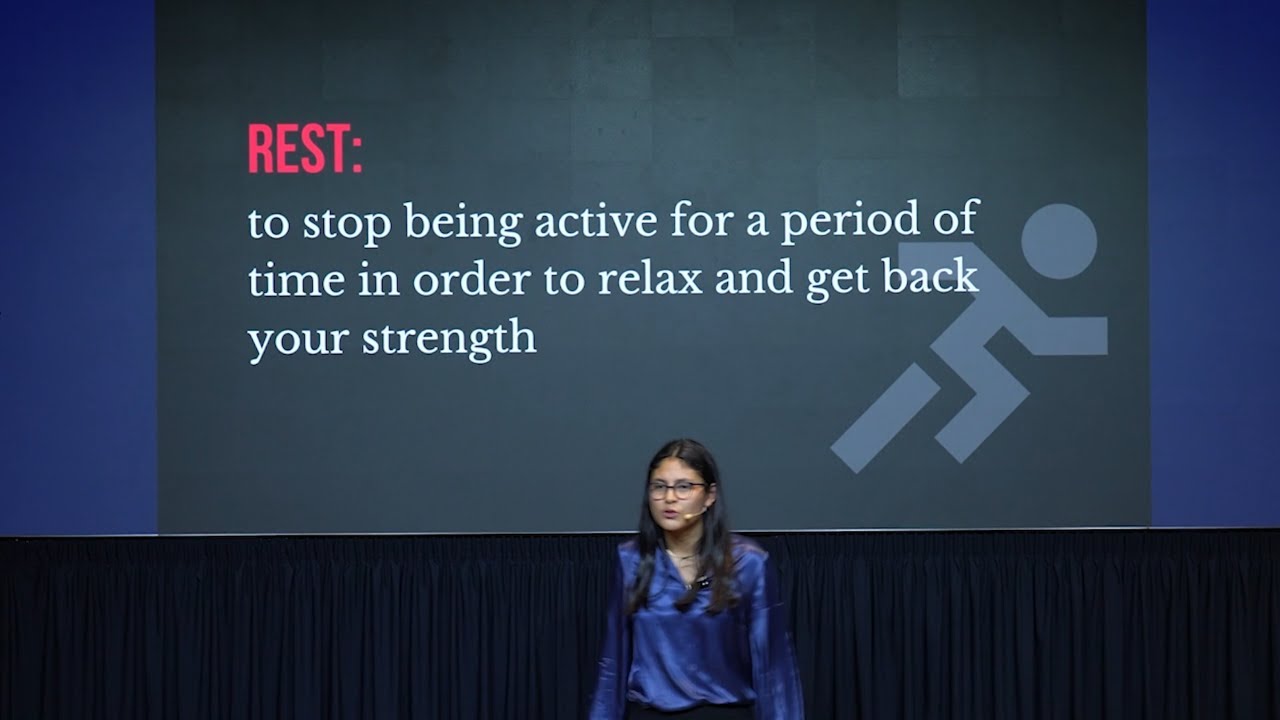- Understanding the importance of rest and recovery in a fast-paced society.
- How diet and nutrition influence metabolic health and insulin sensitivity.
- The role of sleep in managing stress and improving overall health.
- Strategies to incorporate rest and balanced nutrition in daily routines.
- Long-term benefits of prioritizing rest for personal and societal well-being.
In our fast-paced society, rest is often sidelined in the pursuit of progress and productivity. The importance of rest, however, cannot be overstated. It plays a critical role in maintaining metabolic health and improving insulin sensitivity. When rest is prioritized, overall health flourishes, reflecting not just on individual well-being but also on societal levels. Lucía Infantes Garay’s talk at TEDxThe Global College Youth emphasizes this. In her addressing of this critical aspect, she explores why rest is pivotal and how we can achieve it amidst the hustle and bustle of modern life.
Rest and recovery are essential components of a healthy lifestyle, though society frequently prioritizes activity and output. The human body is a complex system that requires downtime to function effectively. Recovery is not just about taking a break; it’s about giving the body time to repair tissues, replenish energy stores, and process information. Good rest supports better decision-making and emotional resilience, which are crucial in handling life’s demands.
A balanced diet rich in nutrients supports metabolic processes that contribute to energy production, repair mechanisms, and insulin regulation. Our daily intake should have proteins, healthy fats, and carbohydrates rich in fiber to support and enhance energy levels sustainably. These food groups play a pivotal role in managing our body’s fuel, directly influencing metabolic health and insulin production. Insulin sensitivity, in particular, benefits from a thoughtful diet, potentially reducing the risk of metabolic diseases.
Sleep is a critical pillar in health management. It affects everything from cognitive abilities to physical health. Chronic sleep deprivation is linked to adverse metabolic outcomes, including obesity, type 2 diabetes, and cardiovascular problems. When we sleep, our body performs crucial functions such as hormone regulation, including insulin, which directly impacts blood sugar levels and metabolic health. Improving sleep hygiene by establishing a regular sleep schedule and creating an environment conducive to restful sleep can enhance both physiological and mental health.
Incorporating rest and balanced nutrition into daily routines may seem daunting, but several strategies can simplify this process. Prioritizing time for rest by scheduling downtime or short breaks throughout the day helps in managing stress. Likewise, preparing meals that include a mix of macronutrients and vital micronutrients encourages a balanced diet. Planning and mindfulness in meal preparation ensure that nutritional goals are met, supporting bodily functions and enhancing energy management. Mindfulness practices such as meditation can also promote relaxation and improve focus, further integrating rest into our routines.
The long-term benefits of prioritizing rest and adopting a balanced lifestyle transcend individual well-being. Regular rest leads to improved energy levels, better stress management, and enhanced cognitive abilities. On a broader scale, when communities embrace these principles, the overall health of society improves, potentially reducing the burden on healthcare systems and increasing productivity in a sustainable way. The conversation around rest is not just about individual self-care; it’s also about advancing societal health paradigms.
Increasingly, scientific research supports what advocates like Lucía Infantes Garay have been championing: rest is a fundamental element of a healthy lifestyle, not an indulgence. By recognizing its importance, society can make informed decisions that promote health and well-being. Including rest in educational curriculums and workplace policies can lead to broader changes, fostering environments where health is a priority.
In summary, rest is pivotal for maintaining metabolic health, supporting insulin sensitivity, and reducing the risk of various diseases. It enhances mental acuity and emotional resilience. In a fast-paced world, implementing these practices into daily life is essential. Such strategies promise not just enhanced personal health, but also societal benefits. They underscore a shift toward recognizing rest as a valuable contributor to life balance and overall well-being. Lucía Infantes Garay’s insights invite us to reconsider how we view rest, urging us to prioritize it amid the demands of modern life.
*****
Source Description
In this TEDx talk, Lucía dives deep into the importance of rest and how it’s crucial for our overall well-being. As students, we’re often overwhelmed by endless assignments, tight deadlines, and the constant pressure to do more. In the hustle to keep up with everything, we tend to forget about the one thing that can help us do it all better: rest. But rest isn’t just about sleep, it’s about giving your mind, body, and spirit the time and space to recharge. Whether it’s mental rest to clear your thoughts, emotional rest to let go of stress, or even spiritual rest to reconnect with your deeper sense of purpose, each type of rest plays a vital role in keeping us balanced and focused. Because at the end of the day, rest is a skill that we need to learn to develop and practice.
#Rest #SelfCare #MentalHealth #Balance #Recharge #Mindfulness #Happiness #WellBeing #BurnoutPrevention
Meet Lucía Infantes Garay! Lucía is close to a professional when it comes to public speaking, in fact, she has been enrolled in many events such as MUN and debate since she was in Year 3. Lucía is resilient and brave, she used to be a professional swimmer but set her priorities on her studies without giving much importance to what others would say, instead she has become a person with great initiative and has perused musical theatre as well as creating different events such as this TEDx event. Her love for reading may shine through her speech as she delivers “Adapting to a fast-paced world: dealing with information overload and the importance of rest and reflection” This talk was given at a TEDx event using the TED conference format but independently organized by a local community. Learn more at https://www.ted.com/tedx

